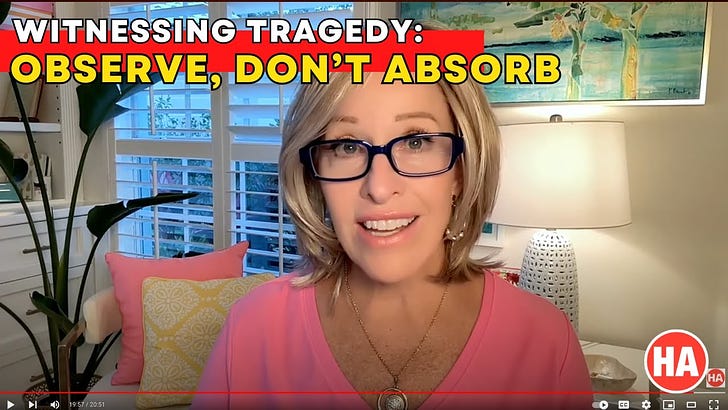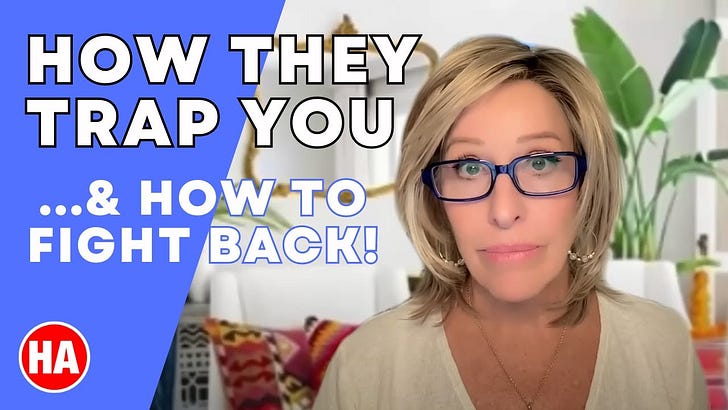In our lives, we often encounter the suffering of others, and it's a powerful experience that can stay with us long after we’ve witnessed it. Think back to a recent moment when you witnessed someone else’s suffering or observed someone grappling with grief. It might have been recently, maybe even today. It's heart-wrenching, isn't it? The sorrow and devastation can weigh heavily on our hearts.
How can we, as compassionate people, endure seeing what people around us are going through? We can feel helpless and even hopeless when we are bombarded with images and messages of devastation. In this video (a replay of a "top hit") I share the exact strategies I use when I'm faced with witnessing the tragedies that seem to be non-stop in our world these days.
Many of you have expressed feeling helpless, unable to sleep, plagued by horrific images of suffering. I completely understand these feelings. But I’m here to share a few tips to help you witness that grief without becoming a victim of it yourself. It’s something I like to call: observe, don’t absorb.
When you see someone else suffering, it hits differently than when you’re the one in pain. Think about how you feel when a loved one is in distress—be it a spouse, a child, or even a beloved pet. The frustration of wanting to alleviate their suffering while feeling powerless can add layers of emotional turmoil to an already painful situation.
In a recent private webinar for my supporters, someone asked how to console a grieving nephew who lost his two-and-a-half-year-old son. Just saying that out loud is enough to send shivers down anyone’s spine. The loss of such a young child is incomprehensible, and the outpouring of compassion from participants was truly heartwarming. What I told them was simple: no matter what you say, the mere act of reaching out carries immense weight. It’s the emotional support behind your words that will leave a lasting impact.
We often worry about saying the wrong thing or making the wrong gesture, leading us to say nothing at all. But those words of encouragement like “I’m sorry you’re going through this” or “I’m here for you” can mean the world to someone in pain. When I faced my own losses, those simple expressions of solidarity helped me tremendously.
Phrases like, “It was God’s plan” or “He’s in a better place” can feel deeply insensitive to someone grieving. Sure, they might have meant well, but it’s essential to cut them some slack—they were just trying to find the right way to offer support. No matter how well-meaning, no words can completely alleviate the pain someone is feeling. Our job is not to lift their burdens entirely but to walk alongside them and bear witness to their journey.
Here’s a story to illustrate this point: A young boy noticed his neighbor was grieving the loss of his wife. The boy went over and sat with him on the steps of the man’s front porch. The boy’s mother watched this from her window and, after a while, saw that the man’s tears subsided. When the boy returned home, his mother asked what he had said to the neighbor to help him feel better. “I didn’t say anything,” the son explained. “I just sat with him while he cried.”
Well, that story is enough to make me cry. That’s a perfect example of sympathy, caring and compassion: simply being a witness to someone else's grief; being there for them, and just showing up. That is often enough.
When we’re faced with the overwhelming grief of others, it’s easy to feel helpless. But let’s remember that there is always hope. Personally, my faith gives me strength. I believe that God uses us to comfort one another, so let’s look for and allow that.
Observing Without Absorbing
Now, here’s how you can observe the suffering of others without absorbing it to the point of feeling helpless.
Recognize Their Journey: It’s crucial to understand that the pain someone else is experiencing is their own journey. You can feel compassion and sorrow for them, but it’s essential not to let their grief consume you.
Offer Practical Help: Moving beyond the emotional realm, consider how you can practically assist someone who is struggling. For example, when my mother was in her final days, a dear friend showed up with a large casserole, no questions asked. That act of kindness provided comfort during a difficult time, alleviating the burden of cooking.
Contribute Positively: If you're concerned about distant events like the recent disasters in Hawaii, consider how you can contribute. Whether it’s sending a card, offering a donation, or checking in with friends in affected areas, think about how you can make a meaningful difference.
Set Boundaries: It's important to be aware of how much time you’re spending consuming news. If you’re glued to the news of massive tragedies, catastrophes, and/or events in far-flung places, this can leave you feeling anxious and overwhelmed. Staying informed is essential, but don’t let obsession take over your life. If it’s impacting your sleep or your relationships, that’s a clear sign you need to take a break. Focus on activities that replenish you—spend time with loved ones, engage in hobbies, and intentionally slow down to live and enjoy the present.
Find the Silver Lining: In times of grief, it can be helpful to focus on the positive aspects, however small they may seem. When faced with challenges, remind yourself of what remains—perhaps the friendships you cherish or the lessons learned. This perspective can serve as a grounding force, helping you to navigate your own emotions. When I experienced overwhelming loss and sorrow while volunteering in animal rescue efforts in New Orleans in the aftermath of Hurricane Katrina, I found myself being swallowed up the unspeakable tragedies I witnessed. What helped me from losing my mind was to focus on all the good what was happening, even in the midst of the trauma. There were countless individuals who had travelled to the area to help as they were able, and even in the chaos and panic, I tried to focus on the good that was being done. I would say to myself, “At least there are other people here that care. At least we are trying to do what we can. At least some animals have been rescued.” This doesn’t altogether minimize the pain and heartache, but it certainly helped me keep my head above the worst waves of overwhelm. I hope that can help you as well.
Finally, acknowledge the pain you feel when witnessing someone else's suffering. It’s normal to feel overwhelmed, and recognizing that helps you navigate your emotions. Time doesn't eliminate these feelings; it allows us to integrate them into our lives.
Here’s the bottom line: no words or actions can completely lift the burden of grief. Whether it’s from illness, a natural disaster, or the loss of a loved one, we must accept that witnessing another’s pain is part of our human experience. Our role is to walk alongside those who are suffering, providing support and comfort as best as we can.
Grief and loss are part of life, and while it’s natural to feel for others, we don’t have to carry all their pain. Be there, offer support, and remember you’re not alone in this. Keep your faith, and balance being strong for others with prioritizing your own well-being.
Remember, you’ve faced challenges before, and you’ll face them again. Each trial is an opportunity for growth. When I remind myself, “I’ve been through tough times before, and I will get through this,” I find hope.
Read Next:








“That’s a perfect example of sympathy, caring and compassion: simply being a witness to someone else's grief; being there for them, and just showing up. That is often enough” —- beautifully and perfectly said ❤️🙏🏾
Like you said, I understand when other’s don’t know what to do, myself included. But when our daughter was in a coma and we were told she was brain dead. In the ICU, feeling alone and in such pain, so many from churches, friends, told me to let them know if we needed anything. That was the last thing on my mind. Starving would have been just fine. After this experience, I have vowed never to put the burden or responsibility on the person suffering. Asking that question, frankly, sounds a bit ridiculous to me now. Even checking back a month or two when no one is visiting or bringing meals. Because when the dust settles, thats another opportunity to reach out and do some good.